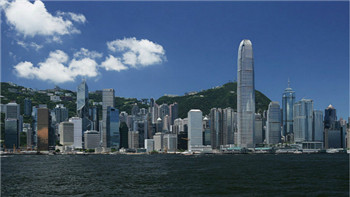(单词翻译:单击)

Henry Keswick, chairman of Jardine Matheson, was once asked what the secret of his family conglomerate’s success was.
怡和集团(Jardine Matheson)董事局主席亨利•凯瑟克(Henry Keswick)曾被问及他的家族企业成功的秘诀是什么。
We never sell, he replied.
他回答道:我们从不出售。
Jardines was one of colonial Hong Kong’s most powerful commercial forces and still owns the most prime office and hotel properties in the business district.
怡和集团曾是香港殖民地时期实力最强大的商界巨头之一,如今仍拥有商务区最高档的写字楼和酒店。
But cornering the rents in Central was not enough to prevent the rise of the four Chinese families that have come to dominate the city’s property market.
但把控中环的租金水平不足以阻止四大华人家族的崛起,后者逐渐主导了香港的房地产市场。
The view from the Financial Times’ Hong Kong office captures the power dynamic.
从英国《金融时报》香港办公室可以看到这种力量格局的变化。
From the 59th floor of The Center at 99 Queen’s Road Central, developed by Li Ka-shing’s property group, you can look east towards his other flagship office tower, the Cheung Kong Centre.
位于中环皇后大道中99号的中环中心是李嘉诚(Li Ka-shing)的房地产集团开发的写字楼。从该写字楼的59层向东望去,你可以看到李嘉诚的另一座旗舰写字楼——长江集团中心(Cheung Kong Centre)。
Together with the Cheng family’s Grand Hyatt hotel tower and 2 International Finance Centre, developed by the Kwok brothers and Lee Shau-kee, these developments surround — and tower over — Jardines’ properties in Central.
再加上郑氏家族的君悦酒店(Grand Hyatt)以及由郭氏兄弟和李兆基(Lee Shau-Kee)开发的国际金融中心二期(Two International Finance Centre),这些大楼环绕在怡和大厦周边,而且高度也都超过了怡和大厦。
But just as the Li, Cheng, Kwok and Lee families overshadow the Keswicks, there are signs that they could be eclipsed in their own backyard — this time by rivals from the mainland.
但在李嘉诚、郑氏家族、郭氏兄弟和李氏家族的风头盖过凯瑟克家族之后,有迹象表明他们可能后院起火,被来自内地的竞争对手所超越。
Unlike Sir Henry, Mr Li does sell, especially when he senses that prices in a sector are reaching their peak.
与亨利爵士不同,李嘉诚会出售资产,尤其是当他感觉某个领域价格见顶的时候。
Last week Hong Kong media reported that the tycoon might sell The Center for as much as HK$35bn ($4.5bn), with those interested including a subsidiary of state-owned Industrial and Commercial Bank of China, the mainland’s largest lender.
上周,香港媒体报道称,李嘉诚可能以高达350亿港元(合45亿美元)的价格卖掉中环中心,感兴趣的买家包括中国内地最大银行——中国工商银行(ICBC)的一家子公司。
If Mr Li fetches such a sum for his tallest building in Hong Kong, it would be one of his biggest asset disposals since reaping $11bn from the sale of an Indian mobile phone group to Vodafone in 2007.
如果李嘉诚以这么高的价格卖掉他在香港的最高建筑物,那将是他自2007年以110亿美元向沃达丰(Vodafone)出售一家印度手机公司以来最大的资产处置活动之一。
Chinese companies have been snapping up Hong Kong office towers and European football clubs in part because of expectations that the renminbi will continue to weaken.
中国内地企业竞相购买香港写字楼和欧洲足球俱乐部,部分是出于人民币将会持续疲弱的预期。
The same logic underlies aggressive bidding by mainland property developers at Hong Kong land auctions.
同样逻辑促使内地房地产开发商在香港土地拍卖中激进投标。
The territory has been governed as a Chinese special administrative region since British colonial rule ended in 1997 and maintains its own currency, which is pegged to the US dollar.
自1997年英国结束其殖民统治以来,香港成为中国的特别行政区,并保留了自己的货币。香港一直实行紧盯美元的联系汇率制。
It is likely to be some time before China Inc surpasses Hong Kong’s big four property families, just as they surpassed the old British colonial houses in the 1970s and 1980s, but the economic forces at work suggest this outcome is inevitable.
中国内地企业超越香港四大房地产家族可能还需要些时日,就像后者在上世纪七、八十年代超越英国殖民时期的洋行一样,但其中发挥作用的经济因素表明,这种结果不可避免。
In their most recent full-year results, the city’s four leading property developers reported total revenues of $26bn — compared with $111bn for the four largest real estate groups on the mainland.
香港4家主要房地产开发商最近的全年业绩财报表明,它们的收入总和达到260亿美元,而内地4家最大房地产集团的总收入是1110亿美元。
If the latter want to build up their land banks in Hong Kong, they have the financial firepower to overwhelm local rivals.
如果后者想要在香港积累土地储备,他们有足够的财力击败当地竞争对手。
It is similarly telling that the three richest men in Hong Kong are on average 89-years-old with fortunes totalling $70bn — against an average 62 and $78bn for their three mainland peers.
同样说明问题的是,香港3位最富有人士的平均年龄为89岁,财富总计达到700亿美元,而内地3位最富有人士的平均年龄是62岁,财富总额达到780亿美元。
Politics is also likely to contribute to the two sets of property tycoons’ relative fortunes.
政治因素也可能造成这两类地产巨头彼此有别的运势。
In Hong Kong’s first decade under Chinese sovereignty, Beijing was hypersensitive to any perception that the one country, two systems formula was not being implemented to the letter.
在香港回归后的头十年,中国政府对有关香港没有完全实施一国两制模式的看法高度敏感。
During that time investment bankers say the central government quietly intervened behind the scenes to prevent Chinese companies from making high-profile acquisitions in Hong Kong.
投资银行家表示,在此期间,中央政府私底下进行干预,以阻止内地公司在香港高调收购。
Ten years on, Beijing is increasingly frustrated with the territory’s democratic aspirations.
十年过去了,如今中国政府日益对香港的民主抱负感到失望。
It welcomes a more overt role for mainland companies there as part and parcel of the Sinicisation it desires.
作为其希望推行的中国化的重要组成部分,它欢迎内地企业在香港发挥更为明显的作用。
The Li, Cheng, Kwok and Lee families are too entrenched — and far too rich — to fade away in Hong Kong.
李嘉诚、郑氏家族、郭氏兄弟和李氏家族在香港过于根深蒂固——而且过于有钱——他们不可能淡出人们的视线。
In their most recently reported financial year, they reaped a total of HK$20bn in tax-free dividends from their mainly monopoly businesses.
他们在最近财年从主要垄断企业中收获了总计200亿港元的免税股息。
But like the Keswicks, they represent the city’s past, not its future.
但是与凯瑟克家族一样,他们代表着香港的过去,而非未来。


